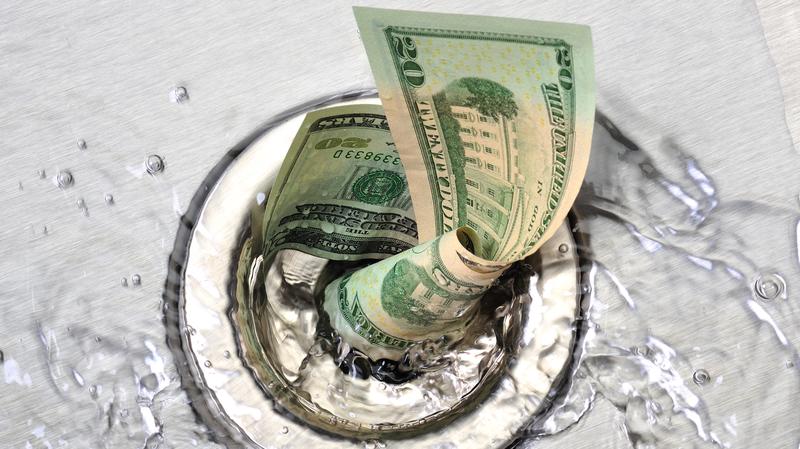
Even smart people make big money mistakes.
Getting rich is really simple, but not everyone can achieve it. We all know the rules – control your spending, save more, and invest your money. But how many people can actually stick to these simple rules?
Majority of people fall prey to money mistakes, and they do exactly the opposite. They rack up credit debts, save almost nothing, and invest poorly.
Why? It’s because they give in to temporary satisfaction instead of long term financial freedom.
If you are one of the many adults who find themselves running out of money before the end of the month, you should take a cold hard look at your financial numbers. The first step that you can do is to assess your financial health.
Record all your earnings and expenditures for 1 month using a money manager. If you have a smartphone, this is a simple task. Download any money manager app and record every transaction for just a month. At the end of the month, add up all your earnings and subtract it with all your expenditures.
Once you get the number, you will be faced with one of the two truths.
Your number is positive. Congratulations! You are one of the few people making more money than you spend. Keep up the good work!
Your number is negative. Like many other working adults, you are overspending, or simply not earning enough. It’s most likely a combination of both. You should seek to cut down your spending or increase your earning abilities.
Whatever your number is, making sure you avoid major financial mistakes will put you one step closer towards financial freedom. In this article, we explore exactly that and examine what you can do to avoid them.
Mistake 1: You Abuse Your Credit Cards
Credit cards are wonderful. With just a swipe with the plastic, you get instant gratification and you don’t even see your hard earned money going out. On the flip side, it’s disastrous when you finally receive your credit bill and sob at the amount of debt you have racked up. Not including the interests on top of it.
With typical credit card compound interest rate averaging at about 18%, it doesn’t take long at all for your debt to snowball out of control. If credit card debt is a cancer, you are multiplying its growth every time you don’t pay off your credit card debt in full.
The solution: Curb Your Spending and Read the Fine Prints
Undeniably, credit cards do offer a lot of convenience – to buy items when you don’t have enough cash, to do online purchases, or to take advantage of promotions and get discounts. However, you need to keep track of your credit card spending and make sure you can pay it off fully at the end of the month.
Credit card companies are required by law to tell you how many months it will take you to pay off your credit card debts if you stick to paying minimum every month. In most cases, the length of repayment is shockingly long due to compound interest on your debt. Even if you manage to pay if off in the end, you are most likely paying more than double the amount of what you have borrowed in the first place.
So, next time your credit card bill comes in, or even better – if you have one lying around now, read the fine prints and take a look at the length of repayment. Once you look at it, you will want to dedicate all your spare money, and even selling some of your unused items on Craigslist to pay off your credit debt as soon as possible.
If you want to get rich, you need to get rid of your credit debts first.
Mistake 2: You Spend to Be Happy
Living on less than what you make is an essential money management skill. Unfortunately, many men and women spend to indulge in temporary happiness, or what we usually call the retail therapy.
Don’t go shopping to change your mood. You mood may change to the better in the very short term, but I assure you – the satisfaction of and fulfillment of achieving financial freedom for the long term far outweighs the temporary gratification.
Furthermore, spending just to improve your mood often brings regret afterwards when you finally realize you have spent unnecessarily on something you don’t need after all.
The solution: Create a “Blow Money” Fund and Learn Delayed Gratification
First, let us clarify what blow money is. It is not the money for you to spend on drugs or alcohol. It is a small sum of money that provides a little bit of wiggle room in your budget every month. You can think of it as “fun money”.
Set a certain percentage of your earnings, for example 5% as your blow money every month. If a retail therapy is inevitable, limit yourself to spending ONLY your blow money.
The key is to include spending on fun things in your budget, and you are more likely to stick to it. If you have blow money left at the end of the month, give yourself a pat on the back and save up the remaining.
Ultimately, you want to learn to appreciate delayed gratification. Resist the small temptations that come along your way to achieve a much larger reward in the long term. The reward may be different for everyone, be it paying off your mortgage and live debt-free, or achieving financial freedom to live your ideal lifestyle. Think about what you really want in life and it will be more likely for you to achieve happiness in the long run.
Mistake 3: You Are Penny Wise and Pound Foolish
It is good to always keep a lookout for promotions and discounts. It is probably satisfying when you know you have grabbed a good deal or saved a few dollars on your groceries. While saving here and there may eventually add up to a tidy sum, more ofen than not it doesn’t amount to much in the big picture of your personal finances.
While you may have saved up a few dollars here and there, you may be losing a few thousand dollars without you being aware of it. Are you still paying a 30-year fixed rate mortgage at 6% because refinancing seems like too much of a hassle? You could be saving a few hundreds a month and tens of thousand dollars in the long term by taking advantage of a lower interest rate and repayment period.
The same thing goes for buying a car as well. If you financed your car through a car dealer, you are paying more than you should. Try saving up for the car and pay cash if it can wait.
The Solution: Examine Your Major Debts and See If You Can Reduce Them
There are a few areas that you can examine, such as mortgage, car loans, credit debts, and student loans. If you are paying off your mortgage at a higher interest rate than the prevailing one, try to see if refinancing is possible.
If you have racked up a few thousand dollars worth of credit card debt, check if you can consolidate them into a single loan with a lower interest rate and a shorter repayment period. Focusing on paying off only one loan with lower interest rate is better than tracking multiple loans with different repayment periods and interest rates.
Next up, examine your student loans and see if you can consolidate them into lower interest loans with shorter repayment period. Read how you can consolidate federal and private student loans here.
The Bottom Line
Getting rich is simple. There are only 3 steps you need to follow to achieve the financial status you have been dreaming of:
- Earn More Money
- Save More Money
- Invest Your Money
Rinse and repeat. Although the theory is simple, not many people can execute it consistently. Only the most determined and hard-willed can achieve financial freedom.
Are you one of them?


Leave a Reply